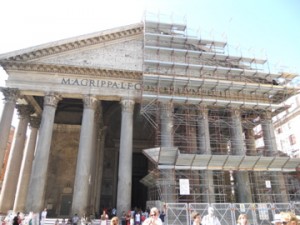This is my first post actually abroad because the dorms were having wireless internet issues, so I have quite a lot to blog about right now.
On Sunday, our flight departed from Newark, NJ and lasted about 9 hours. Along the way we flew over cities in England, France, and Switzerland. On Monday, once we got to see our dorms and were all checked in properly, a group decided to take a walk around the surrounding areas. It felt so surreal to be in Rome, and since everyone was exhausted from the flight, we were pretty convinced we were in a dream. We had out first lecture that day on Roman religion and mythology, and our professors outlined how the course would work throughout the time we are here. After the lecture, a group of us went out to dinner at a pasta restaurant, and had our first authentic Italian meal.

The Pantheon
On Tuesday, our professors took the class on a trip to see a few notable sites. The first of which was the Pantheon, built by Marcus Agrippa. It was amazing to see from an architectural, historical, and artistic perspective. We were able to explore the inside, which was absolutely stunning. I also enjoyed my professor’s lecture on the structure because knowing the historical context of a site always allows for a deeper understanding and appreciation of the work. Following the Pantheon was the Capitoline Museum, an archaeology museum at the peak of the Capitoline Hill (one of Rome’s famous 7 hills). My favorite piece in the collection was known as the Capitoline Wolf, which was created based on the story of Rome’s founders, Romulus and Remus. The museum as a whole was both beautiful and educational.

Capitoline Wolf
Following the museum, we were given leisure time to walk around Rome before our lecture commenced in the evening. A few of us decided that we would have lunch in the kosher section of town, because one girl in the program keeps kosher. It was interesting to see the Jewish part of Rome for Rome is a city which historically has been recognized as one of the major influences in Christianity. Instead of the churches with Latin words which are omnipresent throughout the city, there were temples with Hebrew writing. After lunch, we walked back to our dorms alongside the Tiber River, which is amazing to see after learning about its significance in Roman history.

The Tiber River
After the lecture of Tuesday, a few of us took the subway to a nearby park to watch the Round of 16 matchup of Spain vs. Portugal in the World Cup. I have been following the World Cup closely at home, and in Italy the sport of soccer is hugely popular. There was a crowd of people in the park, all sitting and watching the game on a giant movie screen. There was a great deal of excitement in the crowd, especially since Spain (the team that most were rooting for) came out victorious. Across the street from our dorms is a gelato place, and I bought my first Roman gelato after the game. It comes with three flavors, and every flavor was amazing. My first gelato was banana, chocolate chip, and a dark chocolate. Since I have also tried the lemon, pistachio, and chocolate orange flavors.

Watching Spain vs. Portugal In The Park
On Wednesday, our professors took us to the Coliseum, which has definitely been my favorite place so far. After years of seeing so many pictures, videos, and postcard depictions of the Coliseum, it was unbelievable that I was standing in front of it, let alone inside of it! Countless historic figures must have stood in the same spots I stood, or walked in the same spots I walked in. These are people who lived hundreds of years ago. The idea was just mind-blowing. After the Coliseum, our professors took us across the street to the site of Ludus Magnus, a gladiatorial training ground just outside the Coliseum. Walking back to the dorms, a few of us passed the Ara Pacis, a magnificent building which was built to celebrate the peace that Augustus brought to the early empire. In the evening (after our lecture), my group decided to see some of Rome’s most famous sites that we would not be seeing with our professors. These included the Trevi Fountain and the Spanish Steps, which are in walking distance from one another. The fountain, in my opinion, was breathtakingly beautiful.

The Coliseum
Thursday commenced with a lecture on the Roman emperors, starting with Augustus. Roman history and the stories surrounding the rise and fall from power are amazingly both dramatic and humorous at the same time. This was followed by a trip to Castle Sant’Angelo, otherwise known as Hadrian’s Tomb. This building has gone through many uses over the centuries, including a mausoleum, a fortress, a castle, and a now a museum. The architecture of the building is remarkable, and the exhibits themselves were amazing to view and photograph. The castle has the best view of the city so far, overlooking both Rome and the Vatican.

Castle Sant'Angelo
Today (Friday) also started with a lecture, and this was followed by a trip to the Roman Forum. It was incredible to see sites here such as the Arch of Constantine (which is right before the entrance), the Arch of Titus, and the temple of the Vestal Virgins. After the Forum, a group of us made our way to the Basilica di San Clemente. Today this operates as a church, but in the past it once served as a 2nd century mithraeum, or a place of worship for those who follow the mystery religion of Mithraism. The remains of the mithraeum have been excavated and preserved, and we were able to view the beautiful remains underneath the church.






